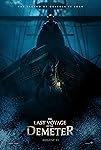Eye For Film >> Movies >> The Last Voyage Of The Demeter (2023) Film Review
The Last Voyage Of The Demeter
Reviewed by: Jennie Kermode

There were a lot of factors involved in the success of Bram Stoker’s seminal 1897 novel, Dracula, but the simple, dramatic power of the writing was not one of them. It meanders, it drifts, it sacrifices prose style to form, it is too concerned with showcasing assorted scientific and supernatural wonders to focus on making each individual page grip. There is an exception to this general weakness, however, and that is the chapter concerned with the legendary Count’s voyage to England aboard the Demeter (a vessel named for the Dimitri, a real ship which ran aground on the Whitby coast just a few years earlier). Presented within the epistolary format as the captain’s log, this chapter is an exercise in how to tell a simple story well. It’s the most chilling part of the book and has long appealed to filmmakers, playing a brief but memorable role in a 1922 adaptation Nosferatu. When it emerged that it was to be filmed by André Øvredal, a modern master of suspense, hopes were high. Unfortunately, despite a highly capable cast, this adaptation just doesn’t have much wind in its sails.
It’s hard to determine just what went wrong, but the most obvious culprit is the script. Co-writer Zak Olkewicz worked on Bullet Train and a lot of the same problems are present here, from the thinly drawn characters to the dependence on action set pieces to drive the plot (which owes little to Stoker’s original) rather than having the plot drive the action. The tension which should stem from being trapped far from help with an unknown, implacable threat (Stoker drew on accounts from ships struck by disease) quickly gives way to the far more conventional business of being scared of a monster, which just doesn’t resonate at the same level.

To be fair, Stoker’s story didn’t focus heavily on building up the characters of those on the doomed ship, so Øvredal and Olkewicz largely had to work from scratch. Bringing in Liam Cunningham to play the captain feels like a short cut, given that he played a very similar character in Game Of Thrones; there’s not much he does here that’s different but his general affability makes it easy to feel for him. The real focus of the film is on the character of Clemens (played by another Thrones alumnus, Corey Hawkins), a young doctor working his passage back home to England in rather more dramatic fashion than he had anticipated, and here the script and performance come together well, as well as providing a hook for the medical dialogues essential to establishing what’s going on. Clemens also takes charge, when she’s discovered, of a curious kind of stowaway, an anaemic young woman who behaves in all manner of suspicious way. She’s played by the always impressive Aisling Franciosi, who enlivens an ultimately predictable role with her usual intensity.
Of the rest, there’s not much to say. The talents of David Dastmalchian and Stefan Kapicic are largely wasted. Javier Botet, who has delivered some memorable monsters in the past, never really comes into his own as the Count, who feels like a by the numbers monster – with the exception of a couple of beautifully set-up shots which precisely capture moments from FW Murnau’s opus. Although we get a bit of the stormy weather mandatory in all ship-based films, and naturally important towards the end, the film lacks the potent atmosphere of the Norwegian director’s previous works, and the Demeter’s crew never feel sufficiently threatened by the elements. If one didn’t know better, one would think it had been made by somebody who had never seen the North Sea.
There have been all sorts of reasons given for the film’s delayed release in the UK, where it eventually premiered at Frightfest 2024. The main one is likely rather prosaic, but one cannot help but wonder if the viewing public’s greater awareness of what that sea is like played a role. It’s also odd not to see Whitby itself used at the end, given what a well known location it is and how little its appearance has changed since 1897 – editing out the occasional car or modern outfit would not seem to be difficult work with today’s technology. That level of accuracy should not be essential, of course, and yet it contributes to a deeper sense that we’re not seeing the real thing, or that, worse, we’re not seeing something believable. Fantasy absolutely must have that in order to work.
So much falls short of its potential here that one rather wishes the film could be remade by the same team with a better script and, perhaps, more time. Who knows how long it might be before the Demeter sails again. This time, sadly, she has run aground.
Reviewed on: 24 Aug 2024

















